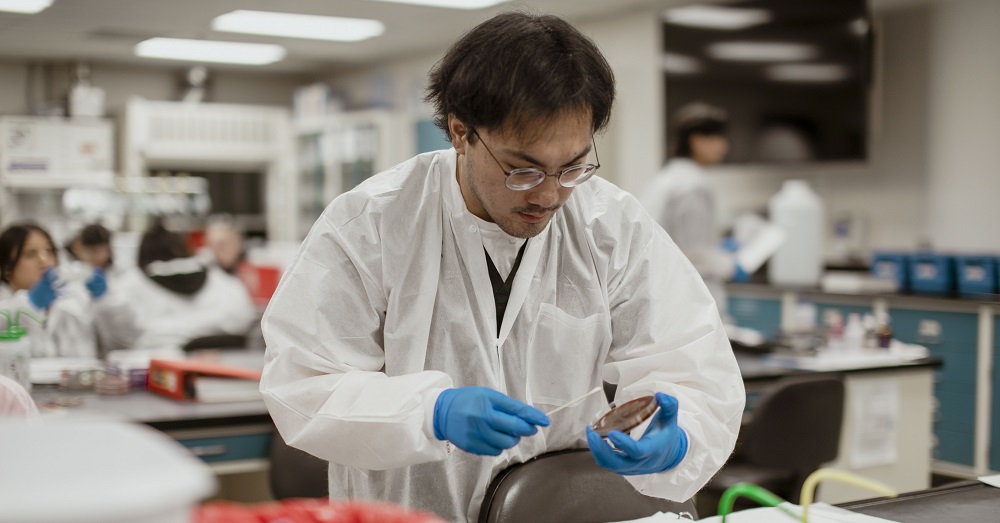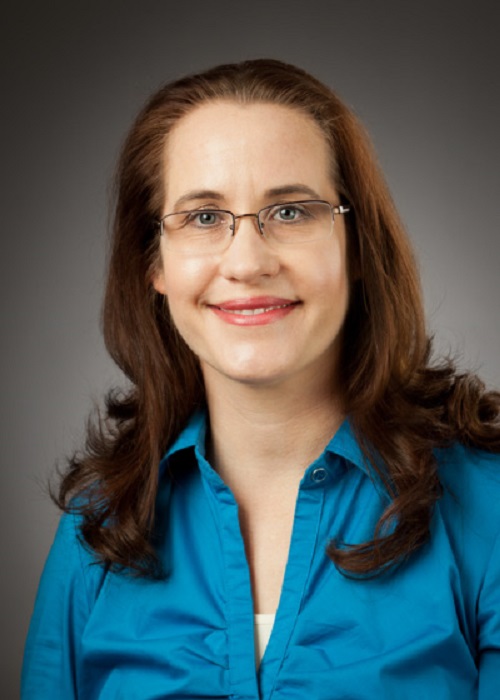Get a Great Job with a Degree in Medical Laboratory Science
MLS, the “hidden field,” is an excellent choice for students considering a medical career.

MLS is an increasingly in-demand field
Medical Laboratory Science (MLS) is an increasingly in-demand field that plays a crucial role in the healthcare industry. From diagnosing illnesses to identifying infections, laboratory professionals working behind the scenes are an integral part of the healthcare team. As the demand for healthcare services continues to grow, the demand for skilled and knowledgeable MLS professionals is on the rise.
It’s time to shine the spotlight on the scientists in the lab working behind the scenes, testing and translating the data that keeps medical treatment moving forward to new frontiers.
We spoke with Tammy Carter, BS, PhD, MT(ASCP), MB(ASCP), about why laboratory scientists are in such high demand as well as the wide array of opportunities that a MLS degree provides. Carter has served as the Medical Laboratory Science Program Director since 2016.
The TTUHSC School of Health Professions offers a Bachelor of Science degree in Medical Laboratory Science along with online hybrid programs designed for students pursuing a second Bachelor’s degree or MLS certification.
Laboratory Scientists: The ‘Hidden’ Medical Profession

Tammy Carter
Carter begins by explaining that a career as a laboratory scientist isn’t typically the first thought for someone considering a medical career.
“We are known as the ‘hidden’ profession,’” she says.
Patients have regular personal contact with their doctors, nurses, therapists and phlebotomists. When blood is drawn or a sample is taken, we often don’t consider where those specimens are going for testing, or who is performing the tests. The same is true for a student interested in science and medicine.
Students often assume that a career in medicine requires one-on-one interaction with patients, whether they want that interaction or not. But, what if they don’t love interacting with patients but do love figuring out what’s wrong and how to help?
The easy answer: Enter a career in Medical Laboratory Science.
Carter explains that many of her students come by way of referrals from counselors and advisors. These are students who have found themselves at a crossroads where they thought a career in medicine had to be as a doctor or nurse, and now realize their strengths and interests lie elsewhere. Specifically, in the lab.
It happens to be a very similar path taken by Carter herself as an undergraduate studying chemistry.
“I didn’t even know it existed,” she says of laboratory science. “My aunt just happened to be flipping through my course catalog and knew that I wanted to do lab work and work with cancer cells, and she’s like, ‘Is this the type of degree you want?’”
The rest is history, or more accurately, her story.
Medical Laboratory Science Job Security
One of the key advantages of pursuing a career as a medical laboratory scientist is the high level of job security that comes with the profession.
Imagine the role that laboratory scientists have played in the last three to four years discovering testing and vaccines for COVID-19. It’s logical to assume that this “hidden profession” of the medical field has taken a hit from the enormous work demands presented by a global pandemic, which led to scientists and technicians literally sleeping in the lab, according to Carter.
“There is a huge shortage of laboratory scientists, not just in Texas, but across
the nation,” she stresses. “It’s a 100-percent employment rate right now.”
While an MLS degree is considered terminal and ample to qualify for a successful career,
medical laboratory scientists have a wide range of career opportunities, including
working in hospitals, research labs, academia, public health agencies and private
companies.
This diversity of career opportunities means that medical laboratory scientists have
a variety of job options to choose from, increasing their chances of finding employment
in a profession that is a good fit for their skills and interests.
While salaries can range from $30,000 to $79,000 depending on education, location
and previous experience, the median salary for a medical lab scientist is about $60,000.
The Bureau of Labor Statistics shows a shortage of medical lab technicians in many parts of the country, proving
the supply and demand of this vital field.
The TTUHSC MLS Programs
For anyone concerned that they’re not the right fit, that they’re too old or too young to pursue a career in medical laboratory science, Carter easily dispels that concern. A wide range of people find themselves interested in this track, from pre-grads to post-docs.
The TTUHSC Bachelor of Science in Medical Laboratory Science is a fully accredited, 2+2 degree program that trains you in clinical laboratory skills and techniques. Students may also obtain a second Bachelor’s degree and/or MLS certification in an online hybrid format.
“I teach a very dynamic group of people with different learning styles,” she says. “At some level, the student has to know how to study. If you don’t know how to study, this is a hard program.”
Both the second degree and certificate options are accredited, 12-month programs for students who have completed a four-year bachelor's degree from an accredited university and wish to obtain a second bachelor’s degree in clinical lab science or acquire additional training to work in the field of medical laboratory science.
Each program combines online lectures and instructional material with a six-day laboratory session conducted on-site at the end of each of the first two semesters. For either program, students are required to complete a clinical preceptorship in an affiliated laboratory.
Related Stories
TTUHSC Receives $1 Million Gift from Amarillo National Bank to Expand and Enhance Pediatric Care in the Panhandle
TTUHSC School of Medicine leaders accepted a $1 million philanthropic gift from Amarillo National Bank on Tuesday (Feb. 10), marking a transformational investment in pediatric care for the Texas Panhandle.
Texas Tech University Health Sciences Center Permian Basin Announces Pediatric Residency Program Gift
TTUHSC Permian Basin, along with the Permian Strategic Partnership and the Scharbauer Foundation, Feb. 5 announced a gift that will fund a new pediatric residency.
The Ph.D. Programs that Shape Health Care
The Graduate School of Biomedical Sciences Ph.D. programs at TTUHSC provide the foundation, mentorship and research opportunities you need to pursue groundbreaking work.
Recent Stories
The John Wayne Cancer Foundation Surgical Oncology Fellowship Program at Texas Tech University Health Sciences Center Announced
TTUHSC is collaborating with the John Wayne Cancer Foundation and has established the Big Cure Endowment, which supports the university’s efforts to reduce cancer incidence and increase survivability of people in rural and underserved areas.
TTUHSC Receives $1 Million Gift from Amarillo National Bank to Expand and Enhance Pediatric Care in the Panhandle
TTUHSC School of Medicine leaders accepted a $1 million philanthropic gift from Amarillo National Bank on Tuesday (Feb. 10), marking a transformational investment in pediatric care for the Texas Panhandle.
Texas Tech University Health Sciences Center Permian Basin Announces Pediatric Residency Program Gift
TTUHSC Permian Basin, along with the Permian Strategic Partnership and the Scharbauer Foundation, Feb. 5 announced a gift that will fund a new pediatric residency.
